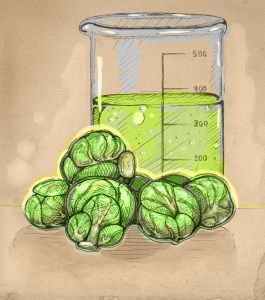An essay by Professor Caldwell Mook, as told to Nick Morrish
Art by Leigh Legler
It is not often that I agree to become personally involved in one of the scientific experiments that I am investigating. Generally, I prefer to observe and deride from a safe distance. However, Doctor Felix Happensnapper’s research into sensory enhancement intrigued me greatly.
Many years ago, as a callow youth living in rural England, I was persuaded to play in a village cricket match. I was allocated a fielding position close to the batsman; a position with the apt name of “silly mid-off.” After a while, I made the mistake of concentrating on a problem of mental calculus, rather than the game in progress. It was the turn of the rival team’s captain to bat. In response to some heckling from the crowd, he swung energetically at the ball which promptly struck me hard on the bridge of the nose.
Interestingly, before I passed out, I clearly recall being able to calculate the velocity and vector of the offending projectile with considerable accuracy.
When I came round, I had lost a large amount of blood and much of my sense of smell. My body efficiently replaced the missing blood cells, but my olfactory nerves were never the same again. I consider this to be a gross design flaw and were it possible, I would certainly have complained to the manufacturer.
Since this unfortunate incident, I have been unable to discern anything but the most pungent aromas and the strongest tastes. Over the last year, I have compensated for this by dining extensively on Goat Vindaloo, a fiery curry dish from south-east India, which even my acquaintances from the Indian sub-continent consider uncomfortably hot.
As much as I enjoy the sensory experience, my new diet has put something of a dampener on my social life, as the after-effects can put be somewhat off-putting to those with a normal sense of smell. I had been searching for a more convenient solution to my problem, so when I heard of Doctor Happensnapper’s work, I put aside my usual skepticism and offered myself as a subject for his experiments.
“We have developed efficient hearing aids, so why not scent aids, taste aids, or even touch aids?” he asked when we met at his Hampshire laboratory.

However, when the nurse returned an hour later to repeat the tests, I found that everything now unaccountably tasted of Brussels sprouts.
To read the rest of this story, check out the Mad Scientist Journal: Winter 2019 collection.
Professor Caldwell Mook holds the Mithering Chair of General Negativity at the University of Leeds, England. He specializes in pre-emptive risk analyses for technology that has yet to be invented. Professor Mook regularly offers discouragement and derision to scientists and engineers around the world.
Nick Morrish is an increasingly mad engineer who lives in Hampshire, England, where his eccentricities are considered quite normal. During a long and futile career, he has worked for a number of frankly certifiable, multinational companies. He clings to the last vestiges of sanity by writing serious and truthful stories about the nature of existence. Since no one else seems to observe truth in quite the same way, his work is often mistaken for satire or fantasy.
Leigh’s professional title is “illustrator,” but that’s just a nice word for “monster-maker,” in this case. More information about them can be found at http://leighlegler.carbonmade.com/.
“The Essence of Sprout” is © 2018 Nick Morrish
Art accompanying story is © 2018 Leigh Legler
